Get the latest financial news, insights and expert analysis from our award-winning MoneyWeek team, to help you understand what really matters when it comes to your finances.
You are now subscribed
Your newsletter sign-up was successful
Want to add more newsletters?

Twice daily
MoneyWeek
Get the latest financial news, insights and expert analysis from our award-winning MoneyWeek team, to help you understand what really matters when it comes to your finances.

Four times a week
Look After My Bills
Sign up to our free money-saving newsletter, filled with the latest news and expert advice to help you find the best tips and deals for managing your bills. Start saving today!
Welcome back.
This week, we turn our weary locked-down eyes to foreign holidays, and specifically to the airline sector. The idea that vaccines could bring the virus under control have made investors – and would-be travellers – optimistic, and the share prices of many airlines are back on the way up. Matthew Partridge takes an in-depth look at the sector and picks the best-placed shares to buy now.
In the podcast this week, Merryn talks to one of our favourite global economists, Dambisa Moyo. She talks about the future role of corporations vs governments at a time when public trust in big companies – not necessarily fairly, says Dambisa – is not particularly high. She also has a lot to say about the economic recovery (or lack of) from the pandemic, the strength of China’s economy, and the prospects for the UK and Europe. Listen to what she has to say here.
MoneyWeek
Subscribe to MoneyWeek today and get your first six magazine issues absolutely FREE

Sign up to Money Morning
Don't miss the latest investment and personal finances news, market analysis, plus money-saving tips with our free twice-daily newsletter
Don't miss the latest investment and personal finances news, market analysis, plus money-saving tips with our free twice-daily newsletter
This week’s “Too Embarrassed To Ask” video takes a look at Dogecoin, the cryptocurrency created specifically to poke fun at the whole cryptocurrency thing, which everyone is now taking seriously after some remarkable gains (and some big falls too). Watch that here.
Here are the links for this week’s editions of Money Morning and other web stories you may have missed.
- Monday Money Morning: The FTSE 100 has clawed back above 7,000 – how much higher can it go?
- Web article: Dogecoin goes “to the moon” – what’s going on?
- Tuesday Money Morning: Why investment advice could be about to get a lot cheaper
- Wednesday Money Morning: China owns a lot more gold than it’s letting on – and here’s why
- Thursday Money Morning: House prices in the UK are still surging – here’s why it’ll probably continue
- Friday Money Morning: Why higher capital gains taxes in the US might be bad news for bitcoin
- Web article: The factors driving Britain’s provincial house-price bubble
Now for the charts of the week.
The charts that matter
Gold’s mini-rally continued. One reason, perhaps, is China’s continued appetite for it, as Dominic Frisby explained earlier in the week.
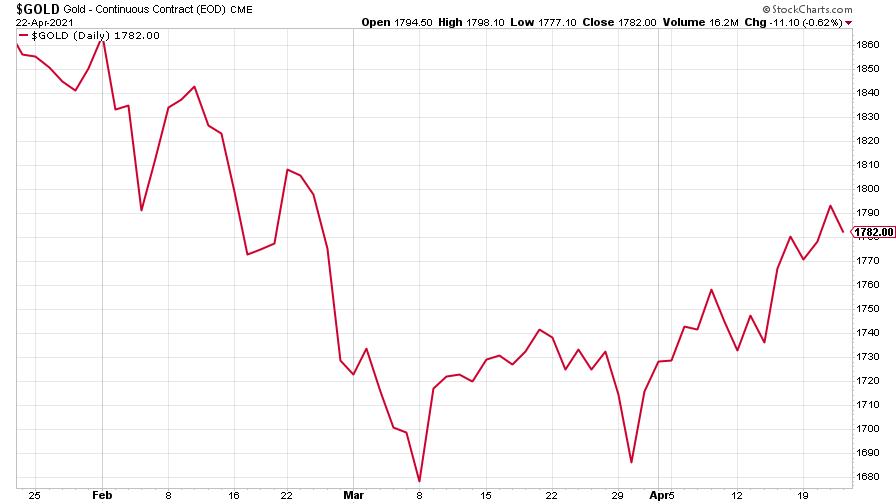
(Gold: three months)
The US dollar index (DXY – a measure of the strength of the dollar against a basket of the currencies of its major trading partners) turned up towards the end of the week.
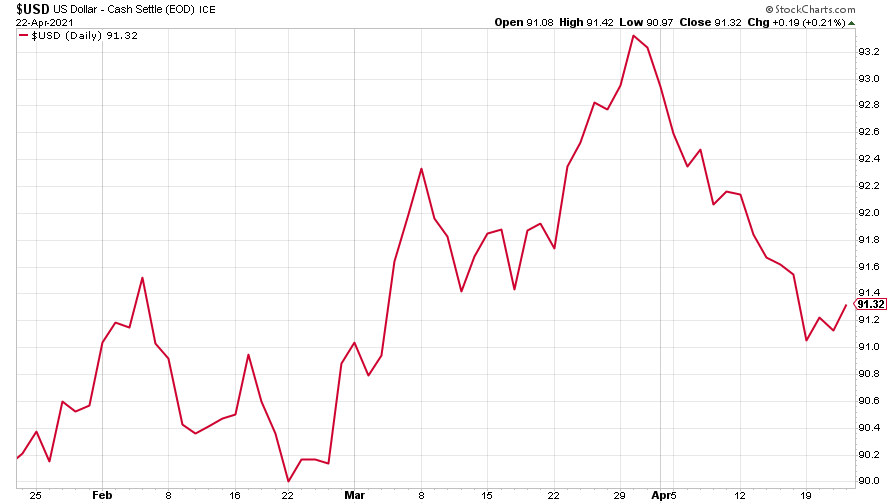
(DXY: three months)
The dollar’s bounce is reflected in chart of the Chinese yuan (or renminbi) – when the red line is rising, the dollar is strengthening while the yuan is weakening.
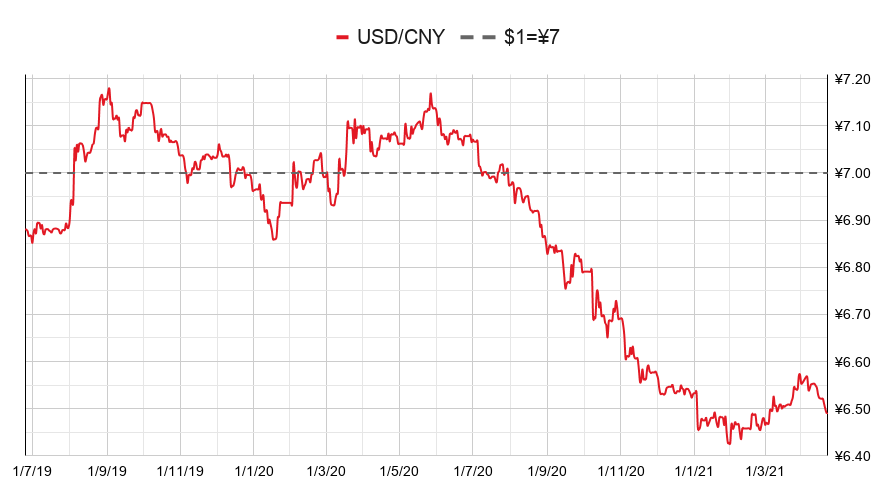
(Chinese yuan to the US dollar: since 25 Jun 2019)
The downward drift in the yield on the ten-year US government bond continued for another week.
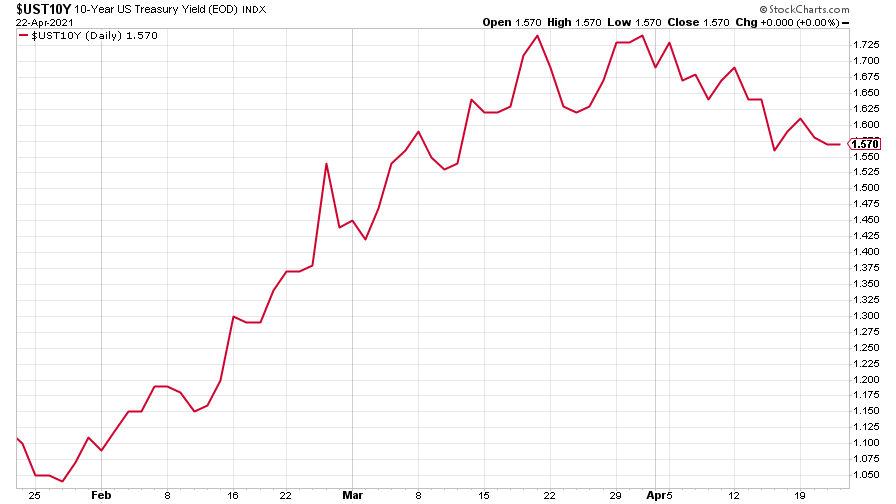
(Ten-year US Treasury yield: three months)
The yield on the Japanese ten-year bond also continued to drop.
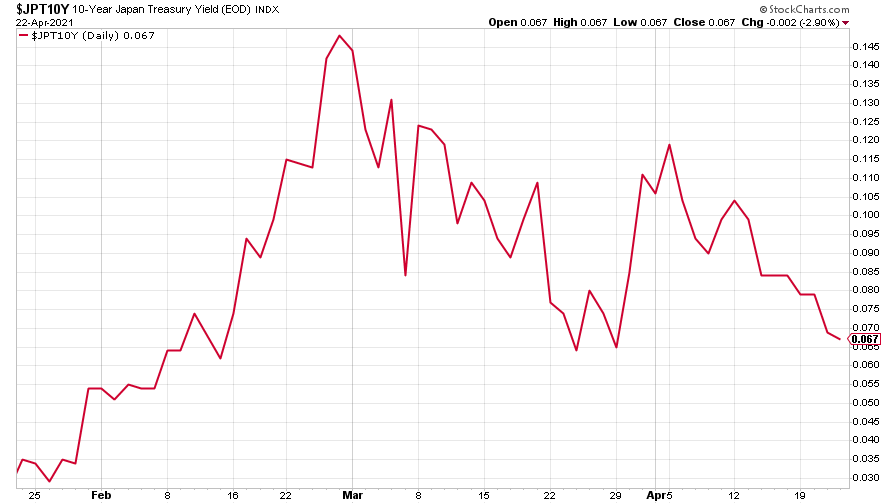
(Ten-year Japanese government bond yield: three months)
The yield on the ten-year German Bund, however, continued its slow rise towards positive territory.
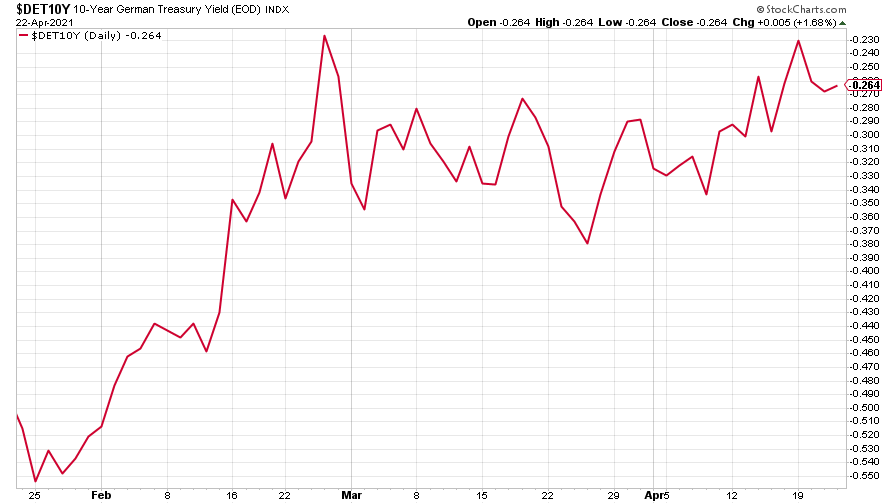
(Ten-year Bund yield: three months)
Copper’s positive mood continued as it headed back up, almost hitting its most recent high.
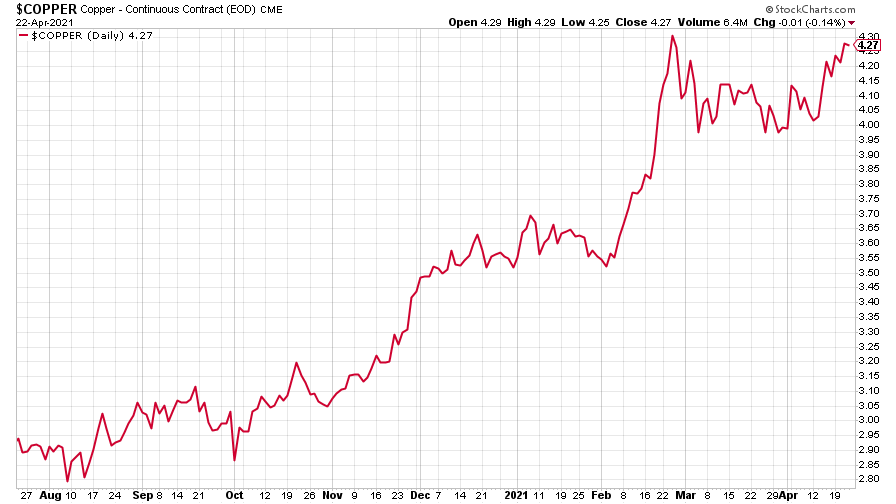
(Copper: nine months)
The closely-related Aussie dollar didn’t seem to share its enthusiasm, however, drifting downwards against the strengthening US dollar.
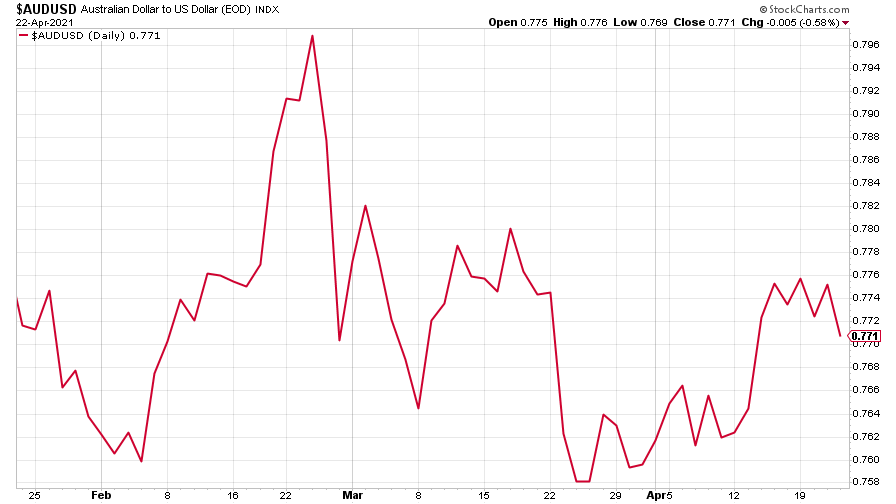
(Aussie dollar vs US dollar exchange rate: three months)
Cryptocurrency bitcoin plummeted this week – a much bigger fall than we’ve seen in recent months. John explained in yesterday’s Money Morning how US president Joe Biden’s plans for higher taxes on “the rich” may have had something to do with it. If you missed, it, have a read of it here.
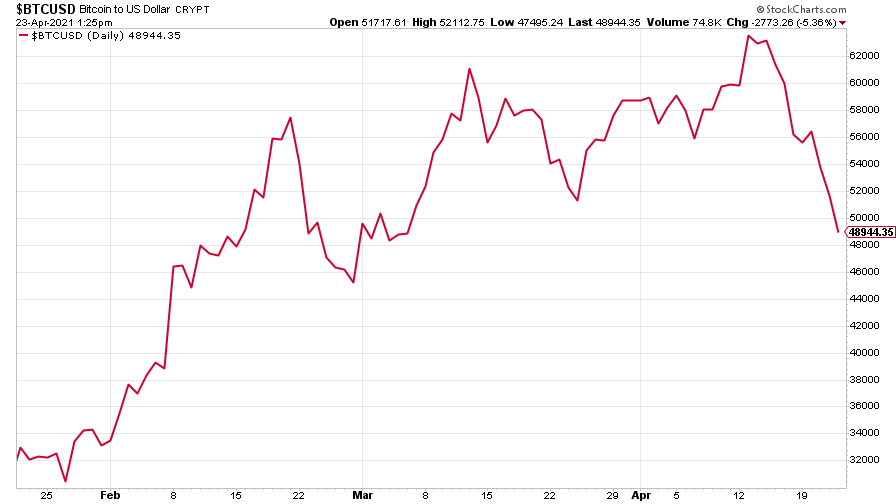
(Bitcoin: three months)
US weekly initial jobless claims fell again – down 39,000 to 547,000, compared to 586,000 last week (revised up from 576,000). It’s the lowest number of claims since March 2020. The four-week moving average fell to 651,000, down 27,750 from 678,750 (which was revised down from 683,000) the week before.
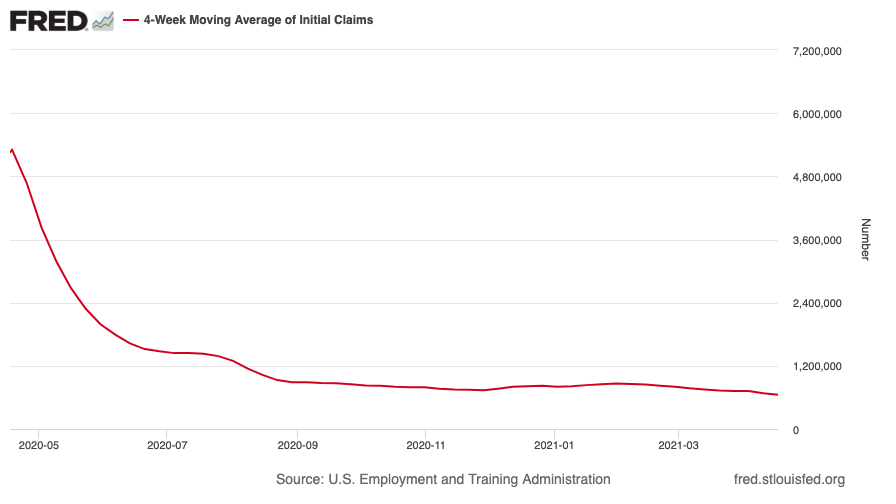
(US initial jobless claims, four-week moving average: since Jan 2020)
The oil price seems to be making its way back up.
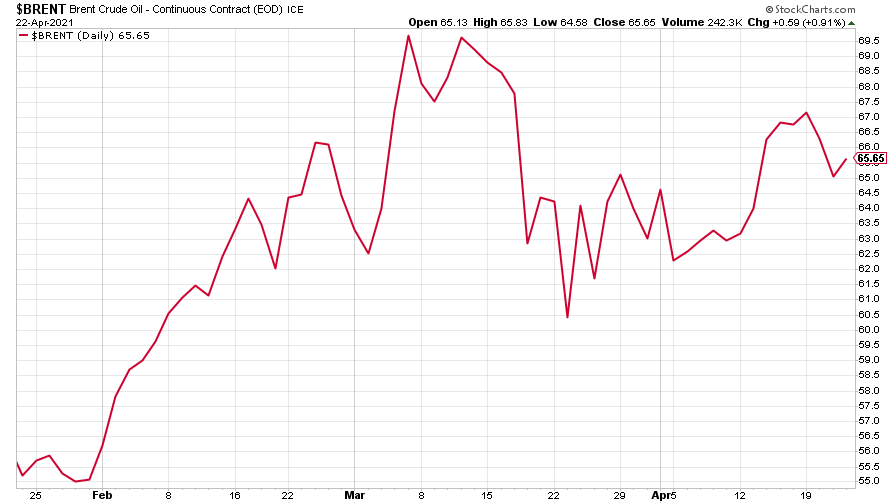
(Brent crude oil: three months)
Amazon continued its modest retreat from its recent high.
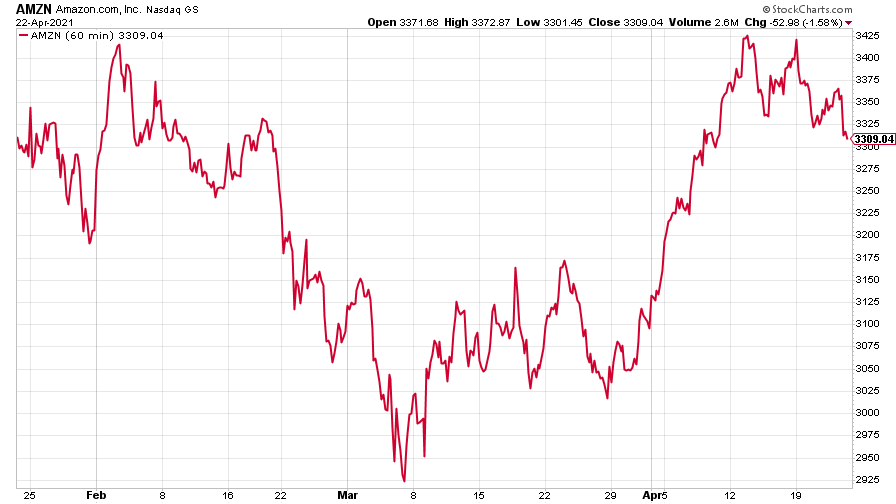
(Amazon: three months)
While Tesla continued to tread water.
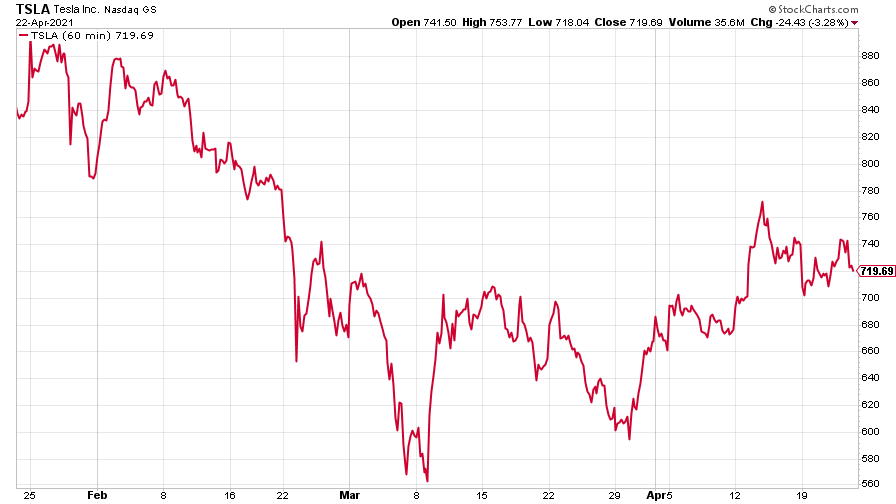
(Tesla: three months)
Have a great weekend.
Get the latest financial news, insights and expert analysis from our award-winning MoneyWeek team, to help you understand what really matters when it comes to your finances.

-
 Should you buy an active ETF?
Should you buy an active ETF?ETFs are often mischaracterised as passive products, but they can be a convenient way to add active management to your portfolio
-
 Power up your pension before 5 April – easy ways to save before the tax year end
Power up your pension before 5 April – easy ways to save before the tax year endWith the end of the tax year looming, pension savers currently have a window to review and maximise what’s going into their retirement funds – we look at how
-
 UK wages grow at a record pace
UK wages grow at a record paceThe latest UK wages data will add pressure on the BoE to push interest rates even higher.
-
 Trapped in a time of zombie government
Trapped in a time of zombie governmentIt’s not just companies that are eking out an existence, says Max King. The state is in the twilight zone too.
-
 America is in deep denial over debt
America is in deep denial over debtThe downgrade in America’s credit rating was much criticised by the US government, says Alex Rankine. But was it a long time coming?
-
 UK economy avoids stagnation with surprise growth
UK economy avoids stagnation with surprise growthGross domestic product increased by 0.2% in the second quarter and by 0.5% in June
-
 Bank of England raises interest rates to 5.25%
Bank of England raises interest rates to 5.25%The Bank has hiked rates from 5% to 5.25%, marking the 14th increase in a row. We explain what it means for savers and homeowners - and whether more rate rises are on the horizon
-
 UK inflation remains at 8.7% ‒ what it means for your money
UK inflation remains at 8.7% ‒ what it means for your moneyInflation was unmoved at 8.7% in the 12 months to May. What does this ‘sticky’ rate of inflation mean for your money?
-
 Would a food price cap actually work?
Would a food price cap actually work?Analysis The government is discussing plans to cap the prices of essentials. But could this intervention do more harm than good?
-
 Is my pay keeping up with inflation?
Is my pay keeping up with inflation?Analysis High inflation means take home pay is being eroded in real terms. An online calculator reveals the pay rise you need to match the rising cost of living - and how much worse off you are without it.
